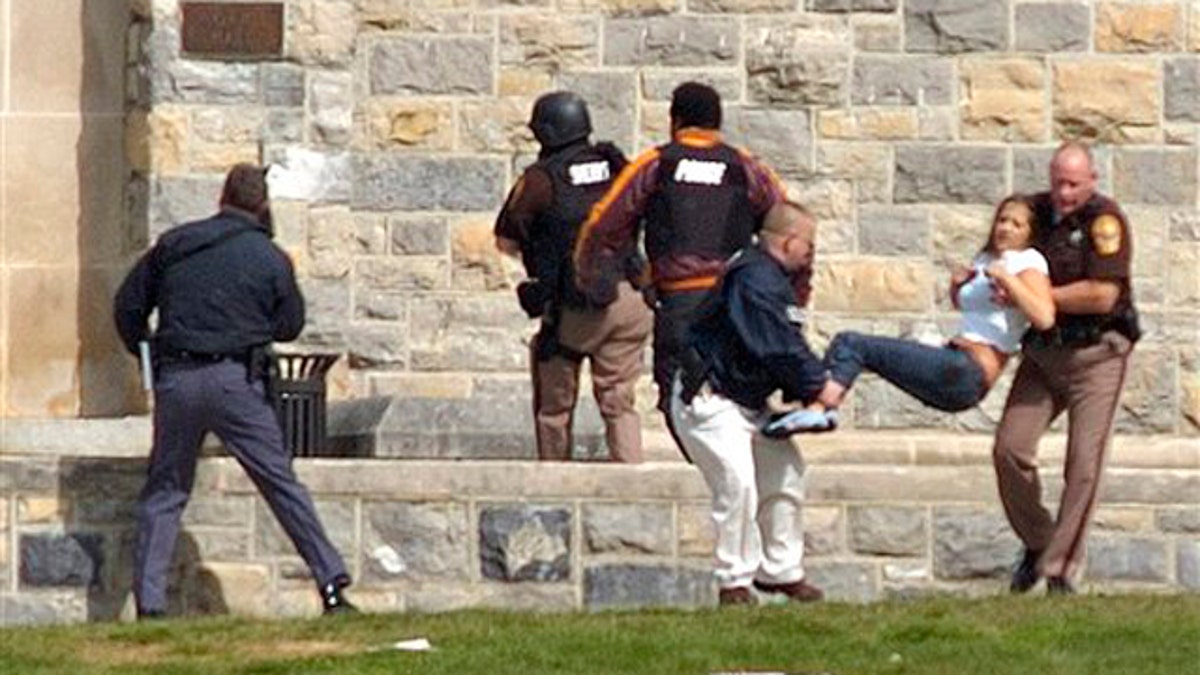
In this April 16, 2007 file photo, injured occupants are carried out of Norris Hall at Virginia Tech in Blacksburg, Va., where student gunman Seung-Hui Cho went on a shooting rampage that left 33 dead, including himself. (AP/The Roanoke Times)
WASHINGTON – Sometimes pushing back tears, the parents of victims in the 2007 Virginia Tech shooting testified Wednesday that they believe their children would have stayed in a safe place far away from where they were later shot if they'd had more information from the university about a safety threat on campus.
That threat was connected to a double shooting in a campus dorm that morning.
An administrative judge is considering Virginia Tech's appeal of a $55,000 fine levied by the Education Department after the April 16, 2007, shootings, which left 33 dead, including the shooter.
The Education Department says the school violated the law by waiting more than two hours after two students were fatally shot in a dorm before sending out a warning by email. By that time, student gunman Seung-Hui Cho was chaining the doors to a classroom building where he killed 30 more people and then himself. The department also says the email was too vague because it mentioned only a "shooting incident" but did not say anyone had died.
The parents described the chaos of that day as they frantically sought answers about whether their children who had been in the second building where the mass casualties occurred were alive, dead or injured.
They said they believed their kids would've stayed away if they'd known about the potential danger because their children had followed instructions to leave campus that same school year when they were told to do so when an escaped convict was on campus.
Suzanne Grimes, the mother of injured student Kevin Sterne, said she thinks what happened to her son could've been prevented.
"He was never informed," Grimes said.
Lori Haas, the mother of injured student Emily Haas, said her daughter only learned about the first set of shootings when she got to class and was told by a fellow student. But she said when she and classmates first heard chaos stemming from the shootings, her daughter described how everyone just thought it was construction noise and didn't realize initially how much danger they were in. She said her daughter's head was grazed by two bullets, and she only lived because she played dead.
Representing the university, Peter Messitt, a senior assistant attorney general for Virginia, said police responding to the initial report of shootings in a dormitory believed the victims were "targeted for a reason" in a domestic incident and thought the shooter had left campus.
The university says it acted appropriately in how it notified the campus that day and has exercised its right to the appeals hearing. It says that it followed standard protocols in place on campuses then and that the department is holding it to a higher standard than was in place at the time.
Specifically, the university faces charges of failure to issue a timely warning and failure to follow its own procedures for providing notification.
James Moore, an Education Department official, testified that there were shell casings, bloody footprints, no weapon on the scene and no suspect apprehended -- all reasons the university should have acted more quickly to notify the campus. Even if it had been a domestic incident, Moore said that shouldn't have mattered.
The hearing before an Education Department administrative judge, Ernest C. Canellos, continues Thursday. Canellos is not expected to issue a ruling until after the hearing.
The fines by the Education Department were levied under a 1990 law known as the Clery Act, which requires colleges and universities to provide warnings in a timely manner and to report the number of crimes on campus. The law was named after Lehigh University student Jeanne Clery, who was raped and murdered in her dorm room by another student in 1986. The maximum fine per violation under the law is $27,500. Institutions can also lose their ability to offer federal student loans, but that has never happened.
During cross examination, Messitt pointed out that the Education Department's own handbook on campus crime that spells out the Clery Act uses examples of colleges that waited days -- not hours -- to alert the campus about sexual assaults and cites the responses as a positive way to handles such cases. Moore said the examples shouldn't be in the handbook.
An appeals hearing in Clery Act cases is rare. Experts say institutions typically agree to fines and take corrective action or reach an agreement with the Education Department.
The Clery Act has gotten recent attention because of sex scandals at Penn State and Syracuse universities.
At Penn State, the department is conducting an investigation into whether the university failed to report incidents of sexual abuse in connection to allegations against former assistant football coach Jerry Sandusky. An Education Department spokesman has said the department is also reviewing whether a similar investigation will take place at Syracuse. Three men, including two former ball boys, have accused former assistant basketball coach Bernie Fine of molesting them as minors.








































